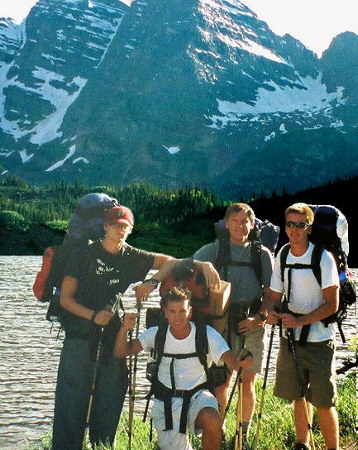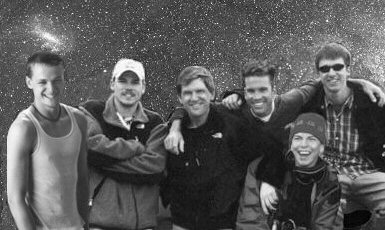| Links |
| Contact Us! |
| Equipment List |
| Camera and Film |
| Other Photos |
Final Thoughts A Look Back at Maroon. The little sign was wrong. There is nothing "deceptive" about Maroon. The risks are obvious the minute you see the ledges, walls and gullies ... and the minute you step on, or grab, any of the treacherous rocks. The six secrets of a safe climb of the Bells are (1) TEST AND DISTRUST EVERY ROCK, (2) stay on the cairned route, (3) be on your way down before afternoon storms set in, (4) wear a helmet, (5) avoid all snow if possible, and (6) never EVER climb underneath anyone including your own friends. A 21 year old from my home town, the son of my aunt's friend, died on our route shortly after we climbed. He was on a seemingly safe and fairly wide ledge. He stopped to adjust his pack. But a pharaoh, an unseen mountain risk that tries to make you part of the ages, was afoot. The young man was climbing under other climbers who dislodged a rock. The rock tumbled down and hit him squarely in the chest.
One Last Pharaoh. Our climb was a lot like tip-toeing past a vicious dog napping in the sun. We got lucky. For a first-time climber, however, such a pleasant experience could be a set-up for future disaster, much like winning big on your first trip to Vegas. You cannot let a warm sunny day, an uneventful climb, and a happy summit experience dull your preparations for the very real dangers you may face on future, less-cooperative peaks. We did not need crampons, but several have died on Maroon for lack of them. We did not need Gore-Tex and fleece jackets, but several have frozen to death on Maroon because they failed to carry them. Our helmets never took a hit, but a climbing guide was killed on Maroon because he failed to wear one. The least little mistake can cost you. For example, how wise was it for us to dump our headlamps at dawn? What if we had been trapped up high at night due to an injury or a storm? So, why climb? Mountains provide an intensely strong motivation for a personal fitness program, and their summits give you a tremendous sense of accomplishment. You must undergo hard physical training, amass clothing and gear, gain skills in using the gear, study the mountain, pack, travel, overcome hardships and anticipate risks ... all for the chance to stand on a summit for a few short minutes. Summits, however, can be a bit anticlimactic. Once on top, you are only concerned about getting down safely and getting a hot shower. So, the real reason for climbing must lie somewhere else. I think the real reason for climbing is a mountain's unique ability to shatter boredom and to bond more tightly those who test its flanks. Even without the tragedy of 9-11, the year 2001 would have lived in our memories forever as "the year we climbed Maroon." We shared an uncommon goal. For a few short days, we felt intensely dependent on each other and, yet, intensely free. The road to such freedom can be a little dangerous sometimes, but it is never boring. And, along that road, you forge friendships that few are lucky to experience. We hope you will take time and look at our: Thank you for visiting. Climb high. Be safe. And write us if you get the chance!
Peace - Joey, Bren, Chuck, Jake, DiShon & Jason
 View Our Guestbook Sign Our Guestbook 
 Peak to Peak Trail and Wilderness Links |

